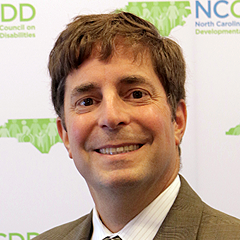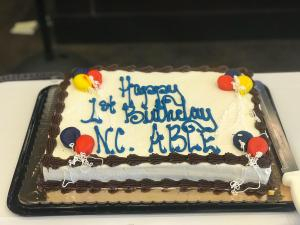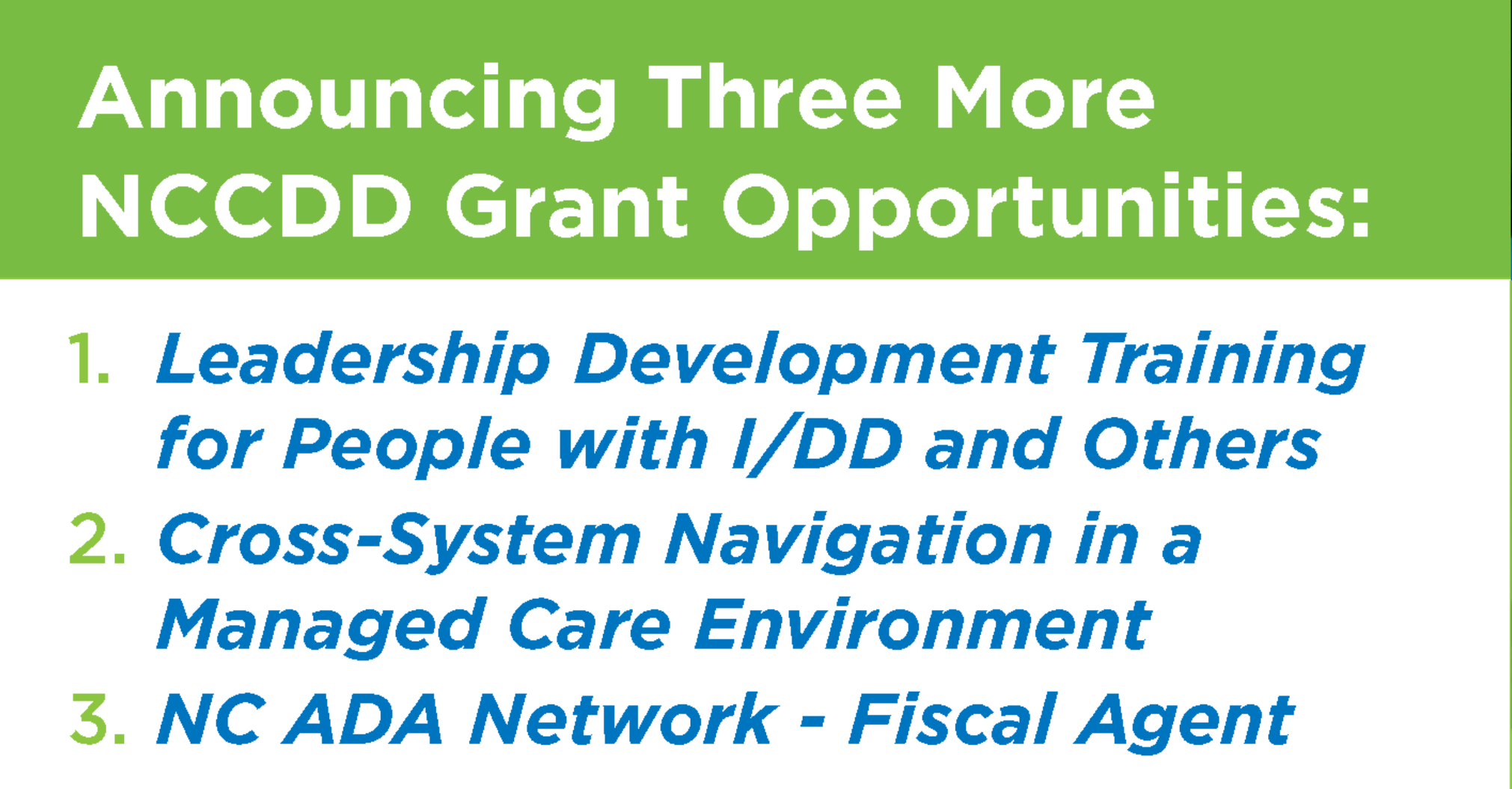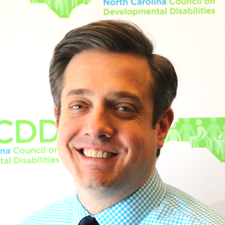February 2018: Highlights and Hot Topics

- EveryBody Works NC - Secretary Cohen Speaks to Outer Banks Chamber of Commerce
- Read the Newsletter Online
A Message from Our Executive Director
 February may be the shortest month of the year, but we had a packed month of great events and an exciting agenda during our first Council meeting of 2018 on Feb. 8-9.
February may be the shortest month of the year, but we had a packed month of great events and an exciting agenda during our first Council meeting of 2018 on Feb. 8-9.
NCCDD kicked off the month in Kill Devil Hills, NC, where NC Department of Health and Human Services (NC DHHS) Secretary Mandy Cohen spoke to the members of the Outer Banks Chamber of Commerce about EveryBody Works NC. The packed room was filled with business leaders, agency leaders and members of the community who learned how people with disabilities are integral to the workforce.
We closed the month with Secretary Cohen speaking in Goldsboro at WorkSource East to bring attention to the value of people with disabilities and how workplaces can benefit from hiring people with disabilities.
In the middle of these great events, we jumped right into our second year of the Council’s Five-Year Plan, focusing on asset development, community living, and leadership development for people with intellectual and other developmental disabilities (I/DD) and families. The Council has released three new Requests for Applications (RFAs) to continue reaching the goals set in our Five-Year Plan. The three new RFAs include cross-system care / case management, leadership development, and efforts to support the Americans with Disabilities Act in NC. We encourage your review and sharing of these newest RFAs (read more below)!
As I close this month’s message, I would like to acknowledge our NCCDD Chair’s completion of her first year of service. Alex McArthur is passionate about the purpose and efforts of the Council and is helping to shape the path of continued success. She is a dynamic leader with a strong vision and we look forward to what is ahead!
Chris Egan
Executive Director
FEDERAL POLICY
Two-Year Budget Deal and 6 Week Funding Bill![]()
On February 9, the House and Senate passed a spending bill that extended government funding through March 23rd (through a continuing resolution) and a budget deal that will raise overall spending through Fiscal Year 2018 and 2019 by just under $300 billion. Congress will need to pass an omnibus bill (a bill which combines all twelve spending bills into a single piece of legislation) to allocate funds for the rest of Fiscal Year 2018 by the March 23rd deadline. Other key components of the signed spending deal include:
- Additional funding for the Children’s Health Insurance Program
- A two-year extension of Community Health Centers
- Money for opioid and mental health services
- A five-year extension of the Maternal, Infant and Early Childhood Home Visitation Program.
- Increased funding for the Child Care and Developmental Block Grant and National Institutes of Health
- Funds for infrastructure, 2020 Census preparation and more.
The Trump Administration 2019 Budget Released
This document, outlines the Administration’s spending and revenue priorities over the next ten years. Many of the proposed cuts would significantly impact individuals with disabilities including: massive cuts to Medicaid, Supplemental Security Income (SSI), Supplemental Nutrition Assistance (SNAP, also known as food stamps), housing programs and Developmental Disability Act programs among others. Click here for a comparison chart to show the proposed cuts in more detail.
While the President's Budget does not have the force of law, it can influence spending decisions in the House and Senate. With $1.5 trillion dollars added to the deficit through the tax bill passed in December, along with the nearly $300 billion in increased spending passed earlier this month, Congress will be looking for ways to dramatically cut spending in the future.
Americans with Disabilities Act
On February 16, the House of Representatives passed the ADA Education and Reform Act of 2017 (H.R. 620) by a vote of 225-192. There is no companion bill in the Senate. H.R. 620 increases the burden on an individual to report a violation over architectural barriers and bring a suit forward. After 28 years, it also increases the amount of time a business has to remedy that violation by 120 days. The bill's supporters argue change is needed to avoid “frivolous lawsuits.” However, the ADA’s federal statute does not allow courts to award monetary damages to plaintiffs. (This is a state issue: Some state laws allow for damages.) Click here to see responses to H.R. 620 from a variety of national and statewide organizations as well as lawmakers.
STATE POLICY
The long session of the General Assembly has adjourned. This past session has been a stop and start session but we are now in adjournment until the Short Session begins in May. However, there are some committees that will meet in the interim.
The Legislative Research Commission Committee on Intellectual and Developmental Disabilities (I/DD), which is focusing on transition from school to work, met on February 6 and heard from several state agencies about their roles in creating employment opportunities for people with I/DD. The Department of Health and Human Services (DHHS), the Department of Public Instruction, the Community College System and Beyond Academics each presented to the Committee. A second meeting is planned for March 1, and they will hear a review from the DHHS Division of Mental Health/Developmental Disabilities/Substance Abuse Services of findings and recommendations from the Education Opportunities for Students with Disabilities report that was previously submitted to the legislature. Several community agencies will also present on their efforts to support employment for people with I/DD.
The bill which was expected to be brought up during the last session, HB 403, was not taken up. This is the bill that was a vehicle for changes to allow the Department of Health and Human Services to proceed with proposed Medicaid transformation. Without these changes, elements of the plan such as the ‘Tailored Plan’ cannot be implemented. It is unclear how the department can move forward with releasing RFPs for potential insurance carriers as planned without the changes. The Council will continue to monitor this situation. There will be efforts in the Legislative Short Session to gain approval for proceeding with the Medicaid transformation.
Related to the Medicaid transformation and move toward integrated care, the Council has been engaged in conversation with insurance carriers who are interested in bidding on contracts when they are released. This has been a great opportunity to educate potential companies about current services and supports for people with I/DD, as well as emphasize the core principles of access, choice, and navigation.
 Mandy K. Cohen, MD, Secretary of the North Carolina Department of Health and Human Services (DHHS), introduced the EveryBody Works NC campaign to local and regional business leaders in an effort to close the 45-point unemployment gap between working-age people with disabilities and those without disabilities in the State.
Mandy K. Cohen, MD, Secretary of the North Carolina Department of Health and Human Services (DHHS), introduced the EveryBody Works NC campaign to local and regional business leaders in an effort to close the 45-point unemployment gap between working-age people with disabilities and those without disabilities in the State.
The Council, in partnership with the DHHS Division of Vocational Rehabilitation, held two events to bring awareness to EveryBody Works NC. The first event was held in Kill Devil Hills, NC with the Outer Banks Chamber of Commerce. The second event was held in Goldsboro at WorkSource East, in partnership with the Wayne County Chamber of Commerce.
“Businesses are looking for good workers who are going to be loyal, long-time employees and be able to do the job that is in front of them,” said Secretary Cohen. “There is an untapped labor market in our disability community. People with disabilities are educated, have worked hard in school, and they need to transition to the workforce.”
To ease the transition, EveryBody Works NC, launched in October 2017, provides resources that are available for potential employees to get a meaningful, competitive job. Vocational Rehabilitation plays a big role in supporting employers and potential employees with disabilities through recruiting, pre-screening process, job training and job coaching.
Additionally, it supports employees with disabilities by providing the modifications they need to be successful at their job. Modifications are minimal and there is usually no financial investment from the employer, added Cohen.
With the right resources, “businesses can meet and hire individuals with disabilities who are loyal and hard workers,” said Cohen. “At the same time, individuals become a part of a team, and have a sense of purpose. It’s a win-win situation for everyone involved.”
Watch Mandy Cohen's speech to business leaders below:
NC ABLE has a Million Reasons to Celebrate First Birthday
Since its launch in January 2017, North Carolina’s Achieving a Better Life Experience (NC ABLE) Program has grown to hold more than $1 million in assets for hundreds of children and adults with disabilities who can now save on their own without fear of losing the Medicaid benefits they need for daily living.
 NC ABLE accounts provide people with disabilities and their families the opportunity to save and invest in tax-advantaged accounts to help meet today’s expenses and invest for their long-term goals. These accounts can be used to cover qualified disability expenses such as, but not limited to, education, housing and transportation.
NC ABLE accounts provide people with disabilities and their families the opportunity to save and invest in tax-advantaged accounts to help meet today’s expenses and invest for their long-term goals. These accounts can be used to cover qualified disability expenses such as, but not limited to, education, housing and transportation.
In a press release from the NC State Treasurer’s office, State Treasurer Dale R. Folwell, CPA, stated, “NC ABLE accounts can make a profound and lasting impact on citizens with disabilities for generations to come. Working with disability advocates across North Carolina and the U.S., we have had a very successful inaugural year and we remain dedicated to providing a first-class NC ABLE program with high-quality, low-cost features.” Folwell also chairs the NC ABLE Program Board of Trustees.
Under federal law, NC ABLE account balances of $100,000 or less are excluded when determining eligibility for most federal and state support programs such as Medicaid and Supplemental Security Income. The legislation that made NC ABLE possible was sponsored by US Senator Richard Burr of North Carolina.
“I’m incredibly proud to see such a successful launch of North Carolina’s ABLE Program at the one-year mark,” said Senator Burr, in the same press release. “These accounts are critical for thousands of families in North Carolina, allowing them to save for a child with a disability future without losing important benefits. As the original sponsor of this legislation at the federal level, this is the future for the ABLE Act that I envisioned.”
After just one year, individual balances in NC ABLE accounts have reached an average of $4,000 – double the typical limit of $2,000.
NC ABLE has been a true representation of financial asset development, Goal 1 of NCCDD’s Five-Year Plan.
“With NC ABLE, people with intellectual and developmental disabilities, their families, siblings and guardians can support a more independent life that encourages employment, living independently, going to school and so much more,” added Chris Egan, executive director of NCCDD.
For more information, visit NC.SaveWithABLE.com or call 888-627-7503.
 NCCDD has released three new Requests For Applications (RFA) aligned with its Five-Year Plan goals of financial asset development, community living, and advocacy.
NCCDD has released three new Requests For Applications (RFA) aligned with its Five-Year Plan goals of financial asset development, community living, and advocacy.
The three new RFAs are:
Leadership Development Training for People with Intellectual and Other Developmental Disabilities, Parents, Professionals and Other Stakeholders
Cross-System Navigation in a Managed Care Environment (Case/Care Management)
NC ADA Network - Fiscal Agent/Intermediary
For more information about the Bidder’s Workshop and how to apply, visit https://nccdd.org/nccdd-announces-three-more-rfas.html
David Ingram joins NCCDD
 “Knowing I’m working with the intention to create a world in which all individuals experience an equality of opportunity, full participation, independent living and economic self-sufficiency,” is the passion that pushes David H. Ingram in his new job as a Systems Change Manager for the North Carolina Council on Developmental Disabilities (NCCDD). Ingram began his new position in January.
“Knowing I’m working with the intention to create a world in which all individuals experience an equality of opportunity, full participation, independent living and economic self-sufficiency,” is the passion that pushes David H. Ingram in his new job as a Systems Change Manager for the North Carolina Council on Developmental Disabilities (NCCDD). Ingram began his new position in January.
Ingram most recently worked as the I/DD Employment Specialist for the Division of Mental Health, Developmental Disabilities, and Substance Abuse Services (DMH/DD/SAS). Prior to that he has worked with the University of North Carolina’s TEACCH program as a Social Research Assistant and also worked as a Vocational Services Coordinator, Regional Director and Employment Services Director for the Autism Society of North Carolina (ASNC).
At NCCDD, Ingram will manage and oversee the Council’s communication initiative and other cross-cutting initiatives as well as be involved in federal reporting requirements. He will attend and represent the Council at various policy-level committees in the community.
“In working at ASNC and DMH/DD/SAS for almost 15 years total, I learned a tremendous amount about the services and supports systems in North Carolina. I’ve used those opportunities to engage in systems change with significant success, both within a large non-profit organization and within the state government,” explained Ingram.
Some of those successes include helping to create ASNC’s Statewide Employment Services Department and serving as co-lead on the US Office of Disability Employment Policy’s Employment First, State Leadership Mentoring Program’s technical assistance grant. “I feel prepared, honored, and ready to use this knowledge and these skill sets to support the Council in affecting the changes the Council and its members desire, both within and throughout North Carolina,” Ingram added.
Citing author Dr. Wayne Dyer’s quote, “If you believe it will work out, you’ll see opportunities. If you believe it won’t, you will see obstacles,” - Ingram says this is his approach to most things in life.
In his new position, Ingram is working to gain as complete an understanding as possible of NCCDD’s initiatives and Five-Year Plan, as well as meeting all of the Council members. He will then focus on supporting the Council’s social networks, governmental organizations and cultural mores to match the Council’s mission of including people with intellectual and other developmental disabilities (I/DD) in all it takes for inclusion in community life.
Ingram also serves on the board of directors for the North Carolina Association of People Supporting Employment First (NC APSE). At home, he enjoys spending time with his wife, Beth, and their four-year-old daughter, Claire. His hobbies include Sci-Fi television shows and movies, year-round co-ed soccer, and a multitude of games such as cards, video games, board games, etc.